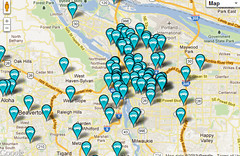How far can the sharing economy go?
As technology lets us share more and more items with greater and greater convenience, how far can the sharing economy go?
In 2009, I was a student in the inaugural graduate studies program of Singularity University. There we were challenged to come up with an idea that could impact 1 billion people within 10 years. Other groups chose to use 3-D printing to build homes in the developing world and mobile phones to create a better disaster response system. We chose to improve our transportation systems by empowering people everywhere to share their cars. This eventually became Getaround.
The Evolution of Sharing
A few years ago, no one would have thought peer-to-peer asset sharing would become such a big thing. With the immense popularity of Airbnb and the emergence of thousands of other sharing companies globally, 2012 has quickly become the year of sharing. Most articles on innovation list “sharing” as a game-changing idea or the hot trend to watch.
The hitch is, there’s nothing new about sharing. Individuals have been finding ways to increase their access to goods and services for some time. You needn’t go further than Small Town, USA, for proof. Chances are good you’ll find a library, laundromat, and what used to be a video rental store. That’s all the sharing economy.
For many years, these “classic” forms of sharing were part of everyday life. Individuals relied on public institutions and private corporations to maximize our access to things we couldn’t afford or didn’t see the value in purchasing ourselves. These organizations provided a formal framework in which to share, assuming the risk of owning the shared assets while enforcing rules and guidelines for participation.
The Present
More recently, there has been a surge in peer-to-peer sharing, and formal sharing institutions are quickly becoming a thing of the past. It doesn’t require an in-depth analysis to recognize the role of technology in this shift. What started online as the sharing of information has quickly turned into a full-fledged economy, with individuals sharing their homes, cars, and skills with the help of mobile devices.
As the sharing economy grows and individuals assume the risk of sharing personal property, they are turning to technology as a way to mitigate those risks. People renting their homes through services like Airbnb are relying on social network profiles and online reputations of potential renters to gauge who they should share their home with, while services such as TaskRabbit link directly into public records that allow them to perform background checks of potential “rabbits.”
Other services have been using technology as a way to provide access to shared goods. Getaround, which enables people to rent cars from people nearby, allows users to grant and gain access to idle cars through mobile phones, allowing users to share assets regardless of geographic location.
via Big Think – Jessica Scorpio
The Latest Streaming News: Sharing Economy updated minute-by-minute








